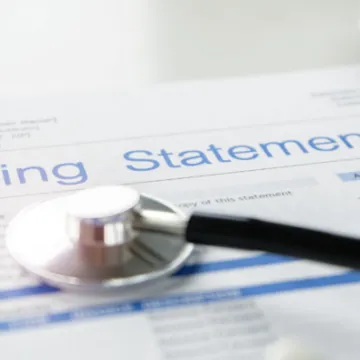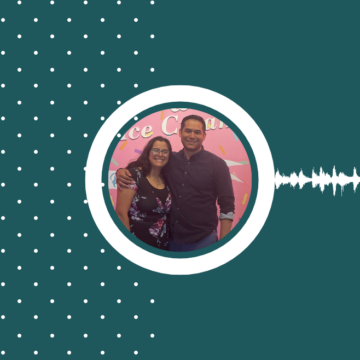Debt stress is real and valid—it can take a serious toll on your mental and physical health.
Small, consistent steps toward understanding and managing your finances can help you regain control and reduce anxiety.
GreenPath’s Debt Management ProgramDebt Management Program can lower your interest rates, simplify payments, and help you find lasting relief from debt stress.
Before we get started:
if you’re experiencing a mental health crisis, please call 988 now—or visit 988lifeline.org to get immediate and free support. Also note that the following article is not medical advice. Please speak to your healthcare provider about any health concerns you have.
Let’s talk about debt (we know, we know…but you’ll want to hear this).
The first step to dealing with a problem is to admit there is one—and debt is a rampant problem for Americans.
It’s not just about money owed. It’s about the feelings that come up when you look at those numbers on your screen or a piece of mail (or even just think about them).
What do you experience when that happens?
Whatever your answer is, know this: debt stress is real, valid, and more common than most people think. If you can relate to any of this, you’re in the right place.
We’ll start by talking about the state of debt in America and how people are feeling about it. Then we’ll get into the emotional and physical effects of debt—and even give it a name.
But we won’t just leave it at that. We’ll provide some actions you can take now to start lowering your stress and reclaiming some peace.
And before we continue, just a reminder: you’re not alone. And there’s hope.
The Weight of Debt in America
Spoiler alert: it’s bleak.
With household debt at an all-time high—and the median household owing over $80,000—it’s no wonder so many of us are stressed.
In fact, a May 2025 survey by Discover (yes, that Discover) is a good temperature check on people’s feelings about their debt:
- 58% feel they will never get out of debt.
- 52% lose sleep over personal debt.
- 48% say their personal debt is unmanageable (including credit card debt, medical debt, and money owed to family or a friend).
We want to assure you that it doesn’t have to be this way.
But when almost half of Americans say money is negatively impacting their mental health—causing “anxiety, stress, worrisome thoughts, loss of sleep, [and] depression”(Bankrate)—something is very wrong.
So debt isn’t just a money problem—it’s a public health problem.
Now that we’ve identified this weight, let’s name it, which itself can provide some relief.
What Is Debt Stress Syndrome?
“I’m just stressed.” Have you ever caught yourself saying that…and then saying it again?
Occasional stress is normal, but cumulative, long-term stress is not (or at least it shouldn’t be).
When excessive debt leads to ongoing stress that impacts your well-being, it’s often referred to as “debt stress syndrome.” While not an official diagnosis, the effects are very real and can take a serious toll on your health.
Even Healthline discusses the toll finance-related stress can take (which can certainly be due to debt):
- Aches and pains: Including headaches and stomach aches.
- Avoidance: Leaving bills untouched and generally staying away from your finances.
- Analysis paralysis: Struggling to make decisions and overthinking minor ones.
- Lack of balance: Most of your time goes to work because you think that’s the only way.
- Rigidness: Planning your budget down to the last cent and getting upset if something changes.
- Rumination: Thinking constantly about your debt, even when your focus should be elsewhere.
- Sleeplessness: Lying awake at night, worrying.
All of this can impact your relationships, decisions, and confidence.
Does any of this sound familiar?
If so, read on. We’ll now take a closer look at how debt stress syndrome can affect your brain and body.
How Debt Impacts Mental and Physical Health
Here’s the full-body toll debt can take on you—both mental and physical (Debt.org) We urge you to go through these and identify which effects you’re experiencing, if any.
Debt’s effects on mental health include:
- Denial: Some people keep spending despite worsening finances, ignoring problems until crisis hits—credit denial, foreclosure threats, or debt collector calls—while interest and fees pile up.
- Stress: The flip side of denial. Debt and stress go hand in hand, showing up as sleepless nights, lost focus, and constant worry—especially with credit card debt.
- Anxiety: The body’s reaction to financial stress—racing heart, headaches, shaking, shortness of breath. Around 40 million Americans experience anxiety, often triggered by money worries.
- Anger: “Debt-Anger Syndrome” can make people lash out—at creditors, employers, spouses, even themselves. It damages relationships and can cause headaches, heart issues, and weakened immunity.
- Depression: After anger fades, hopelessness takes over. Low self-esteem can fuel “emotional spending,” deepening the debt-depression cycle and feelings of despair.
While debt’s effects on physical health include:
- Blood pressure: Stress can raise blood pressure, especially when combined with poor diet or existing health issues.
- Heart rate: Prolonged stress can disrupt your heart’s rhythm, increasing the risk of stroke or cardiac events.
- Immune system: Chronic stress weakens immune defenses, leaving you more vulnerable to illness.
- Mood: Stress takes a toll on emotional well-being, straining both your mental health and personal relationships.
- Memory: Ongoing stress can cloud focus and impair memory, creating a frustrating cycle of forgetfulness and worry.
- Weight changes: Stress may cause weight gain or loss, both of which can impact heart health and blood pressure.
These symptoms can lead to vicious cycles that worsen your health and/or your financial situation. For example, they may prompt someone to turn to unhealthy coping behaviors like gambling, hoarding, and substance abuse.
If that happens (or is happening), it doesn’t mean you’re “irresponsible” or any other negative label. It’s just a response to excessive stress. And it’s about replacing unhealthy responses with healthy ones.
We want to emphasize that chronic stress puts your health at risk, but action breaks the cycle! Even small actions, like the one you’re taking now by reading this article. Here are more steps you can take to help.
9 Actions to Reduce Debt Stress
Before we get into these, we want you to know that progress matters more than perfection. Try these one at a time, at your own pace. And don’t be hard on yourself if you stumble. Just get up, dust yourself off, and keep going.
1. Name Your Fear
Avoidance adds anxiety.
Name what your actual fear is (for example, “I feel stuck”). You’ll almost instantly start to feel a little better.
2. Know Your Numbers
Listing out your debts gives you more clarity and control.
Even if it’s scary at first, seeing the full picture reduces the unknowns—and makes it less scary. It’s kind of like turning on a light in a dark room. A lot of what makes us afraid is the unknown.
3. Make a Repayment Plan
Just having a plan, even a simple one, brings hope.
Use tools like the snowball or avalanche methodsthe snowball or avalanche methods, or seek help from a nonprofit like GreenPath to assist you. Avoid declaring bankruptcy: there are many alternatives to bankruptcythere are many alternatives to bankruptcy, which should always be a last resort.
4. Automate Where You Can
Set up auto-payments or transfers to reduce the mental load of managing bills. It really does simplify your life.
5. Celebrate Small Wins!
Did you pay $25? Great! Every single step matters and builds momentum.
6. Build a Mini Emergency Fund
Setting aside $100 in a savings account can reduce panic when surprise expenses hit. Start small.
7. Talk to Someone
Whether it’s a friend, relative, or financial counselorfinancial counselor, don’t carry this alone. Connection can bring tangible relief.
8. Practice Self-Compassion
Debt is not a character flaw.
It’s a widespread problem that many people are facing (as we covered above). Be kind to yourself. You’re doing what you can to work through it.
9. Limit Shame-Triggering Media
If social media or traditional media makes your debt stress worse, just turn it off, or limit your use.
Your journey is your own. You don’t need to compare yourself to anyone else.
Finally, we’ll mention one more strategy that’s been effective for many people we’ve worked with: a debt management program.
How a Debt Management Program Can Help
A debt management programdebt management program (DMP) is a structured, assisted solution that leads you to financial and emotional relief.
What is it exactly?
Well, it’s a way of consolidating your debts, but it’s not a consolidation loan. It’s a personalized roadmap for paying off your debts, usually offered through a nonprofit credit counseling agency like GreenPath.
A great part of it is that we advocate for you. We work with more than 550 creditors nationwide with the goal of securing lower interest rates and waived fees that can save you both time and money.
You’ll be supported the entire way, from the day you contact us to the day you make your final debt payment.
The emotional relief can be felt after you enroll: fewer bills, fewer collection calls, and a clear payoff date. It’s one of the most powerful tools for reclaiming financial stability and peace of mind.
It’s Going to Be Okay
Hopefully you’re already feeling a little less stressed by the end of this article. You’re now equipped with more knowledge and actions to take.
Just remember, you’re not alone. And your debt is manageable.
GreenPath is here to help. We’re a nonprofit whose mission is to empower people to lead financially healthy lives—and help free as many people as we can from debt stress syndrome. Our compassionate, certified counselors would love to speak with youspeak with you about your situation.
GreenPath Financial Service
Debt Management Program
GreenPath is a 60-year trusted national nonprofit, learn how GreenPath’s Debt Management Program can help you pay off your debt in 3-5 years, while helping you develop sound financial literacy.










